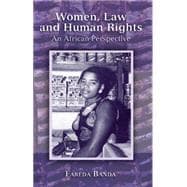
What is included with this book?
| Preface | vii | ||||
| Acknowledgements | xi | ||||
| Table of Cases | xix | ||||
| Table of Statutes and Legal Material | xxiii | ||||
| 1 Introduction | 1 | (12) | |||
|
7 | (3) | |||
|
10 | (3) | |||
| 2 Law in Africa | 13 | (28) | |||
|
14 | (3) | |||
|
17 | (2) | |||
|
19 | (2) | |||
|
21 | (4) | |||
|
25 | (2) | |||
|
27 | (6) | |||
|
33 | (7) | |||
|
40 | (1) | |||
| 3 Human Rights in Africa | 41 | (44) | |||
|
42 | (2) | |||
|
44 | (1) | |||
|
45 | (2) | |||
|
47 | (4) | |||
|
51 | (6) | |||
|
57 | (9) | |||
|
66 | (13) | |||
|
79 | (3) | |||
|
82 | (3) | |||
| 4 Family Law, Gender Equality and Human Rights | 85 | (74) | |||
|
87 | (3) | |||
|
90 | (3) | |||
|
93 | (4) | |||
|
97 | (3) | |||
|
100 | (3) | |||
|
103 | (5) | |||
|
108 | (4) | |||
|
112 | (2) | |||
|
114 | (2) | |||
|
116 | (3) | |||
|
119 | (2) | |||
|
121 | (3) | |||
|
124 | (5) | |||
|
129 | (7) | |||
|
136 | (2) | |||
|
138 | (6) | |||
|
144 | (4) | |||
|
148 | (9) | |||
|
157 | (2) | |||
| 5 Violence against Women and Reproductive Rights | 159 | (48) | |||
|
160 | (1) | |||
|
161 | (4) | |||
|
165 | (4) | |||
|
169 | (1) | |||
|
170 | (2) | |||
|
172 | (4) | |||
|
176 | (3) | |||
|
179 | (1) | |||
|
180 | (1) | |||
|
181 | (19) | |||
|
200 | (5) | |||
|
205 | (1) | |||
|
206 | (1) | |||
| 6 Female Genital Cutting, Human Rights and National Legislation | 207 | (40) | |||
|
207 | (1) | |||
|
208 | (2) | |||
|
210 | (2) | |||
|
212 | (6) | |||
|
218 | (7) | |||
|
225 | (4) | |||
|
229 | (1) | |||
|
230 | (1) | |||
|
230 | (1) | |||
|
231 | (4) | |||
|
235 | (2) | |||
|
237 | (2) | |||
|
239 | (1) | |||
|
239 | (6) | |||
|
245 | (2) | |||
| 7 Culture, Development and Participation | 247 | (50) | |||
|
248 | (2) | |||
|
250 | (3) | |||
|
253 | (6) | |||
|
259 | (4) | |||
|
263 | (4) | |||
|
267 | (2) | |||
|
269 | (5) | |||
|
274 | (5) | |||
|
279 | (6) | |||
|
285 | (9) | |||
|
294 | (3) | |||
| 8 Conclusion | 297 | (14) | |||
|
298 | (1) | |||
|
299 | (5) | |||
|
304 | (2) | |||
|
306 | (3) | |||
|
309 | (2) | |||
| Appendix A: Protocol to the African Charter on Human and Peoples' Rights on the Rights of Women in Africa | 311 | (14) | |||
| Appendix B: Convention on the Elimination of All Forms of Discrimination Against Women 1979 | 325 | (12) | |||
| Bibliography | 337 | (56) | |||
| Index | 393 |
The New copy of this book will include any supplemental materials advertised. Please check the title of the book to determine if it should include any access cards, study guides, lab manuals, CDs, etc.
The Used, Rental and eBook copies of this book are not guaranteed to include any supplemental materials. Typically, only the book itself is included. This is true even if the title states it includes any access cards, study guides, lab manuals, CDs, etc.